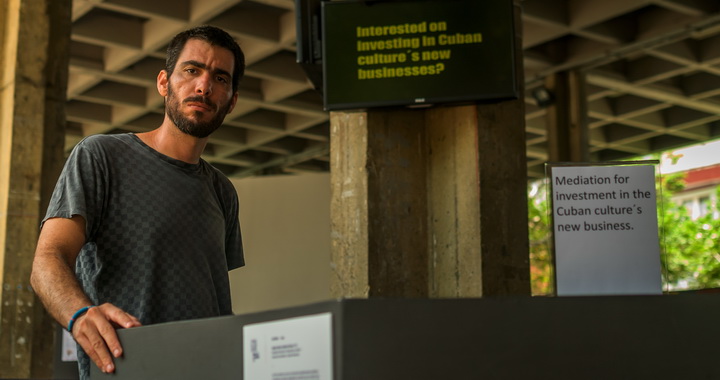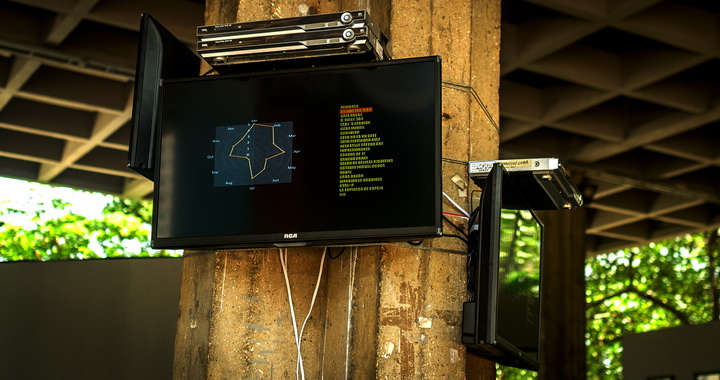
A ‘stock exchange’ in Cuba
HAVANA — Rain is forecast for this afternoon. These past rainy days were very bad for the “business business,” says Levi Orta, sarcastically. He’s talking about his Capital=Culture project, which he defines as “the tropicalization of a stock exchange.”
The idea is “to extract, let us say, the capital that may be moving in the public at the Havana Bienal and to inject it into the new enterprises involving Cuban culture.”
What he means is half art, half economy mixed together. Looking at a portfolio with the first 21 businesses, anybody who went through the Cuba Pavilion could walk over and ask. Although the fundamental objective was foreign partners, there are also Cubans interested in “participating as shareholders.”
If you want your business to “be listed on the exchange,” you must fill the form for proprietors, and if you’re ready to place some money you must fill the form for investors. The initiatives presented range “from the carpenter who builds wooden horses for house painters” to a restaurant that is frequented by “show-business folks.”
“Practically every bar has decorations made by a craftsman, so everybody gets involved,” Levi says.
Cuban boom?
The project emerged in 2010, after the new openings and economic changes. Because culture is one of the main contributors to the Gross National Product, Levi concluded that the sector would soon enter “all this psychosis of productivity.”
According to the National Office of Statistics, culture and sports contribute to the GNP more than farming, cattle raising and forestry, and more than fishing, the sugar industry, mining, science and technological innovation put together. Even so, or perhaps because of it, the Portfolio of Opportunities for Foreign Investment does not consider any opportunities in culture.
 Law 118 allows foreign investors to associate only with Cuban entities with legal personality. But self-employed entrepreneurs are natural persons. Levi was aware of this “problem” and had figured out a solution.
Law 118 allows foreign investors to associate only with Cuban entities with legal personality. But self-employed entrepreneurs are natural persons. Levi was aware of this “problem” and had figured out a solution.
“Many real investors behind restaurant businesses are foreigners. So, how do they do it? Exactly as I’m going to do it. The strategies are the same. There are many illegalities in this space, and little by little the government will have to enter into this menu of possibilities.”
It’s not that simple. “I try to do things as legally as possible, so all the investment is mine. Whenever it becomes allowed, then, God willing … it might be. But if there’s any other way, I don’t know it,” says Caridad Gómez, owner of the gym Popeye’s Spinach.
She would like to invest in more space for her business but for now is in the “stock exchange” mostly for the promotion. “If it’s advertising for my business, it’s okay. And on top of it — it’s free,” she says.
In contrast, La Casona de 17, a cooperative that’s “detached” from the Ministry of Tourism, could have an easier time — technically speaking. “Remember that we’re in a process of experimentation,” says Yadira Alfonso, the recording secretary. “From now on, we need to see what steps to take. We’d have to go through the MINTUR because even though we’re not part of it, it controls us.”
Whether or not the law allows it, the letter is not the same as the politics. Rodrigo Malmierca, minister of Foreign Trade and Investment, has said that foreign capital may be directed “exceptionally” to the development of activities by non-state organizations that have legal personality.
“It seems to me that there’s very little creativity regarding economic initiative,” Levi says. “We are the dreamers. However, often people grow discouraged and give up when they see the obstacles.”
If there’s no path in the jungle, hack one. Ten days before the Bienal ended, the project had signed up 68 businesses and 20 investors. Potential financing was 50,000 dollars and the minimum investment was 100 dollars.
“Nobody gave us anything,” Levi says. “I don’t have a strongbox there. What I do is mediate, propose third options, so to speak.” He deals with small businesses with certain needs, people willing to invest money in them. He’s an intermediary. Supply and demand, Capital = Culture.
A partner for my business
“Beyond the possibility of investment, as a sociological boost, it’s interesting to sense all the dreams of prosperity among the Cuban people,” Levi says. “On the foreign side, too, because you notice how they’re looking at Cuba — fertile, practically virgin territory for investments. They watch any initiative that moves, drags or breathes.”
Anyone who tries to figure out if this constitutes a work of art or an economic project might not find a definitive answer. “To me, obviously, this is an artistic initiative, because I’m a very bad businessman, even though I’m trying to do things right.”
In the triangle that encompasses culture, foreign capital and private enterprise, Levi found a “no-man’s land.”
“Beyond this work, I like the frontiers, not as limits but as a place where several things connect and a kind of land grab takes place.”
Johannes Abreu, a doctor in Economic Science and a specialist in the arts industry, opines that the expansion of self-employed activities and their participation in culture are a valuable contribution.
“I don’t think that they’re here to compete or contradict anything. Where they are competitive, where they generate positive cultural spaces, we need to use them.
“We would have to find ways — more from the economic side than from culture, in my opinion — to couple those processes well. To regulate the work of a self-employed person who has a cultural center; to liberate the process of management so that the artists may undertake and generate alliances inside and outside the institutions. We need to find convergence, understanding, not antagonism.”
The 12th Havana Bienal ends today (June 22). “Afterward begins the task of connecting investors with business owners,” Levi says. Of course, there’s a surplus of expectations. “Right now, I see it as a task that could be interesting in several spaces. For example, seeing how it could work somewhere else, like Miami. I might even restage it here two years from now. It would probably be unnoticed because there would be 20 exchanges more interesting than mine.”


